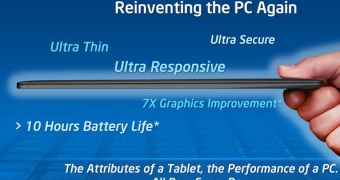There has been a lot of talk recently about what Intel might or might not manage to do on the IT market next, and it looks like a sort of decision may have been met at last, part of it involving a so-called reinvention of the PC market.
Though Intel continues to state that it sees no threat from ARM and AMD on the IT market, pressure is said to be mounting.
Among other things, it has been implied that Intel could have a harder time that expected in its quest to secure tablet design wins, while even Apple's MacBooks are no longer a given, new ULV chips or no.
That said, it is now reported that, with even the Nokia partnership turning out to be a bust, the Santa Clara, California-based company has decided on a new course of action.
Apparently, while it will definitely work to bring the Medfield to market, hoping for good smartphone adoption, its focus will again be enforced upon the PC market.
On the one hand, the top-tier IT player claims that the so-called “traditional” PC market won't suffer because of tablets, especially as far as desktops go.
Nevertheless, the outfit is “redefining,” so to speak, the actual concept of PC, with its concept art showing what resembles, to a great extent, the Apple MacBook Air.
In other words, Intel sees future PCs, at least mobile ones, as very thin and lightweight devices, mostly powered by CPUs with a TDP (thermal design power) of 15W.
Currently, the standard TDP is of 35W. Coupled with what laptops are expected to look like in the future, it becomes clear that notebooks will soon be something along the lines of tablets with physical keyboard and all the ports for video, USB peripherals, an optical disk drive and overall high performance, all inside a small package, or at least a really thin one.

 14 DAY TRIAL //
14 DAY TRIAL //